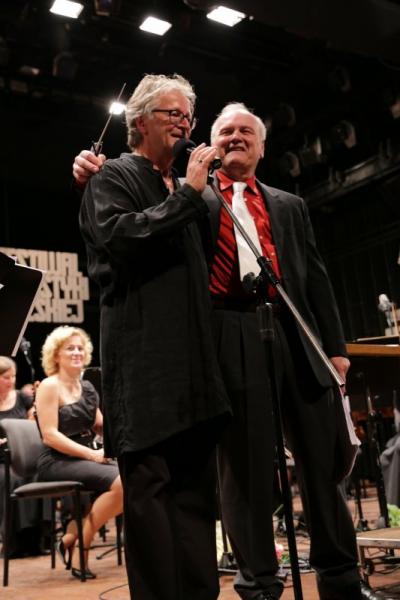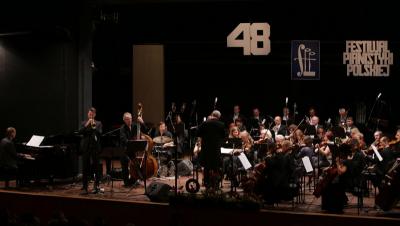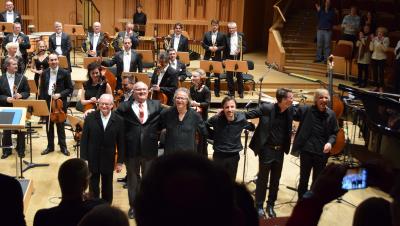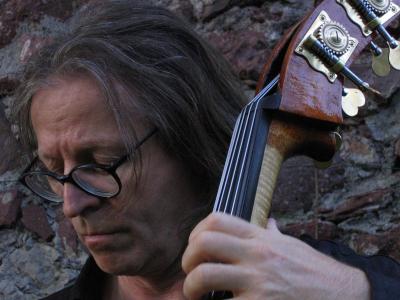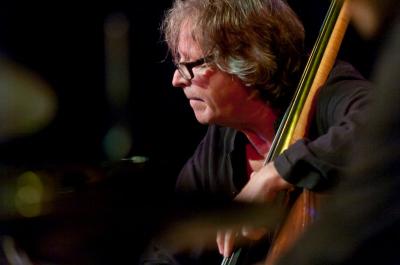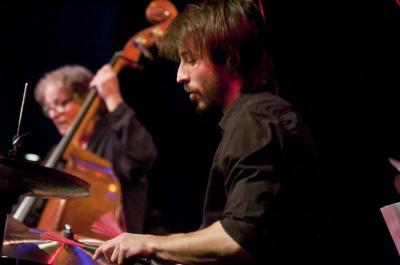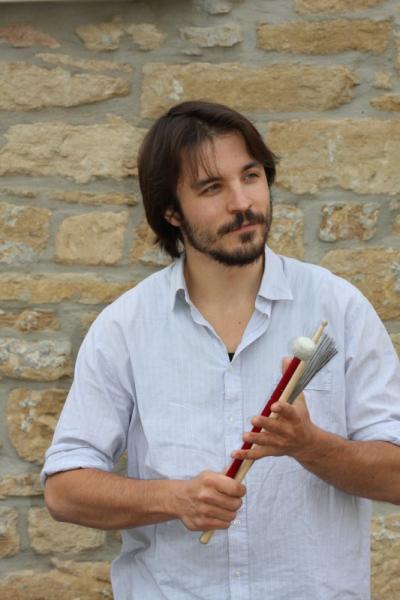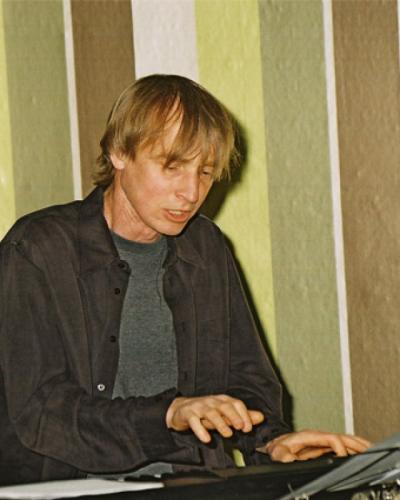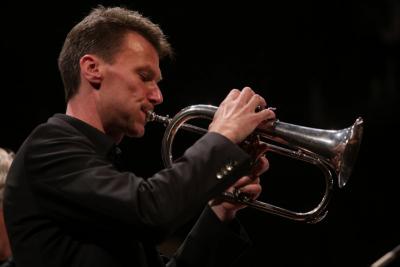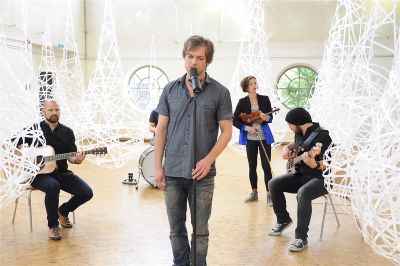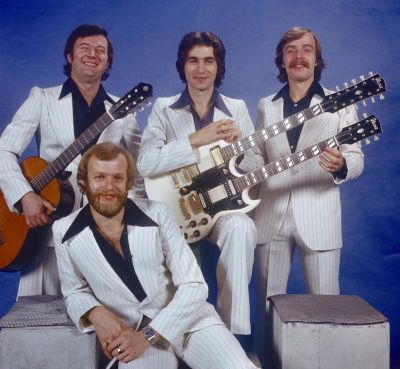Lech Wieleba – Poetic Jazz
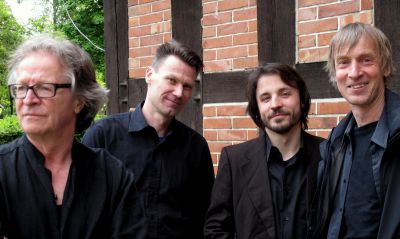
The album “Lech Wieleba – Poetic Jazz Symphonic” is the first ever recording made by a Jazz ensemble and a classical symphony orchestra. In an interview Wieleba said that a mixture of a jazz band and a classical orchestra was highly unusual: “We simply waited for the right moment”. And Bohdan Jarmołowicz added in the DVD that the collaboration between an orchestra that traditionally plays from sheet music with a jazz ensemble that plays long phases of improvisation, was a creative challenge. You can hear from the audience reaction that the performance by Poetic Jazz took on a greater depth: indeed they greeted the music by Lech Wieleba “with open arms”. Brief everyday tales were inserted into the programme. As Weber says: “We all know what it’s like to wait for a telephone call in vain and the number “Waiting for the Call” was meant to express this feeling. “Everyone hates the rain”, he says, “but I remember one morning in Provence when after sixty days of draught and heat it suddenly began to drizzle and the sun came out. I had never been so happy to see the rain and that’s why I wrote “La Chanson de la Pluie” and dedicated it to the rain”. “Dla Ireny” and “Zbynio” are homages to his mother and brother. “Tangeczko” (English: Little Tango), personally arranged by Wieleba, and “Blue Tango Nuevo” can also be recognised as variations on a tango, even by people unacquainted with the style. And if you listen carefully you will not only hear references to classical orchestral music. In “Mazur” (“Mazurka”) the description of the landscape in Masovia opens out into a folk dance from the region, just as Smetana’s description of the “Moldau” move on to become a dance at a peasants’ wedding celebration. And Wieleba’s “Dance of the Elves” seems at least to be inspired by the opening sequences of Debussy’s “Prélude à l’après-midi d’un faune”, before the jazz improvisation gives it a new dynamic.
Lech Wieleba studied double bass at the Konservatorium in Danzig (now Zespół Szkół Muzycznych w Gdańsku-Wrzeszczu) under Stanisław Rosiek, with whom he also completed his course in 1977. For the next four years he played at the State Opera House and in the Philharmonic Hall in Danzig. But he had long been interested in jazz. As early as 1975 he appeared at the Jazz Jantar Festival in Danzig (founded in 1973) in a band put together by the American Don Cherry (1936-1995). In 1980 he was awarded the Krzysztof Komeda Prize. In the same year he was the winner of the Jazz nad Odrą (English: Jazz on the Oder) Festival in Breslau with the band Antiquintet and appeared at Poland’s oldest international jazz festival, the Jazz Jamboree Festival in Warsaw. In 1982/83 he went on a tour of Europe with Polski Teatr Instrumentalny that had been set up by the saxophonist Ryszard Misiek (1947-2010) in Danzig.
After moving to Hamburg in 1984 Wieleba began to establish himself in the German music scene. He accompanied the song maker Franz Josef Degenhardt (1931-2011) on three CDs (1986 “Junge Paare auf Bänken. Franz Josef Degenhardt singt Georges Brassens”, 1987 “Da müssen wir durch”, 1988 “Stationen”), and on Udo Lindenberg’s album “Hermine” in 1987/88: all the albums were released by Polydor. In 1987 Wieleba worked on the soundtrack for a two-part TV documentary drama directed by Horst Königstein. In the same year he played Celtic music with the Californian band Golden Bough for the LP “Winding Road” on the Arc Music label. In 1993 he joined up with Bernd von Ostrowski (vibraphone), Hans-Jörn Brandenburg (piano) and Hans-Peter Stiller (drums) to create The Classic Jazz Quartet and coproduce a CD with “Modern Jazz Classics” that was recorded in the Lichtwarksaal of the Carl-Toepfer-Stiftung in Hamburg. He also worked in musical productions in Hamburg, like “The Phantom of the Opera”, “Closer than Ever” and “Fiddler on the Roof”. For six years he worked with the action artist and cultural manager André Heller, including a period as the musical director of the Berlin Wintergarten-Varietés on a tour of Germany, Switzerland and Austria between 1993 and 1995. In 1998 and 2002 he joined up with Witek Kornacki (clarinet) and Angel Garcia Arnés (guitar) to form the Sureste Tango Trio and record the CDs “Soledad”, “Pasión en Tango” and “María de Buenos Aires” with music by Astor Piazzolla. Between 1998 and 2005 he toured a huge number of European countries with the Sureste Tango Trio. He also composed the music for theatre productions like “La Musica”, based on a book by Marguerite Duras, in the Theatron in Hamburg and “Chawale” in the Theater am Hechtplatz in Zürich.
